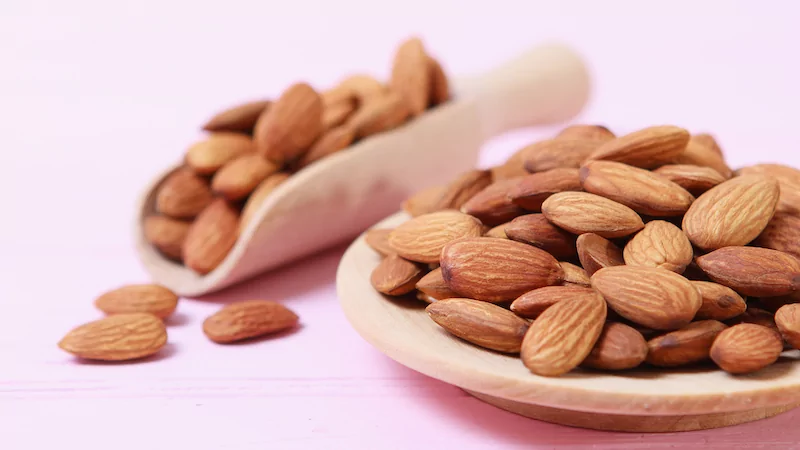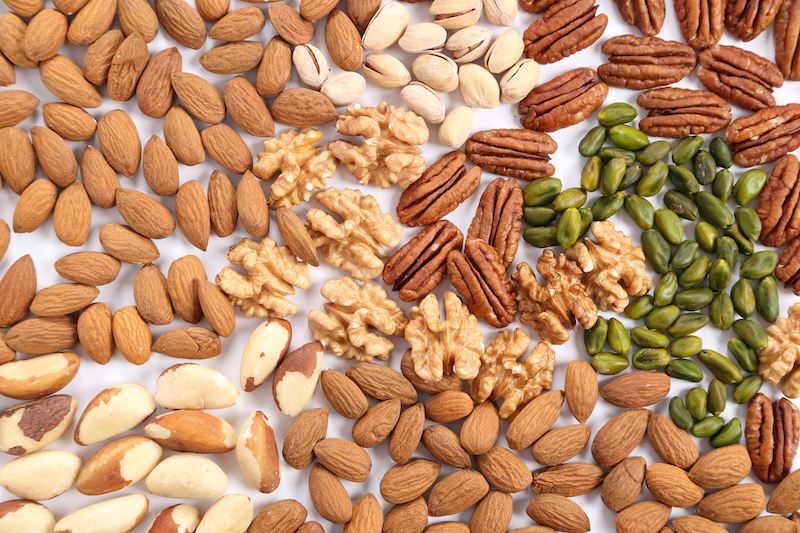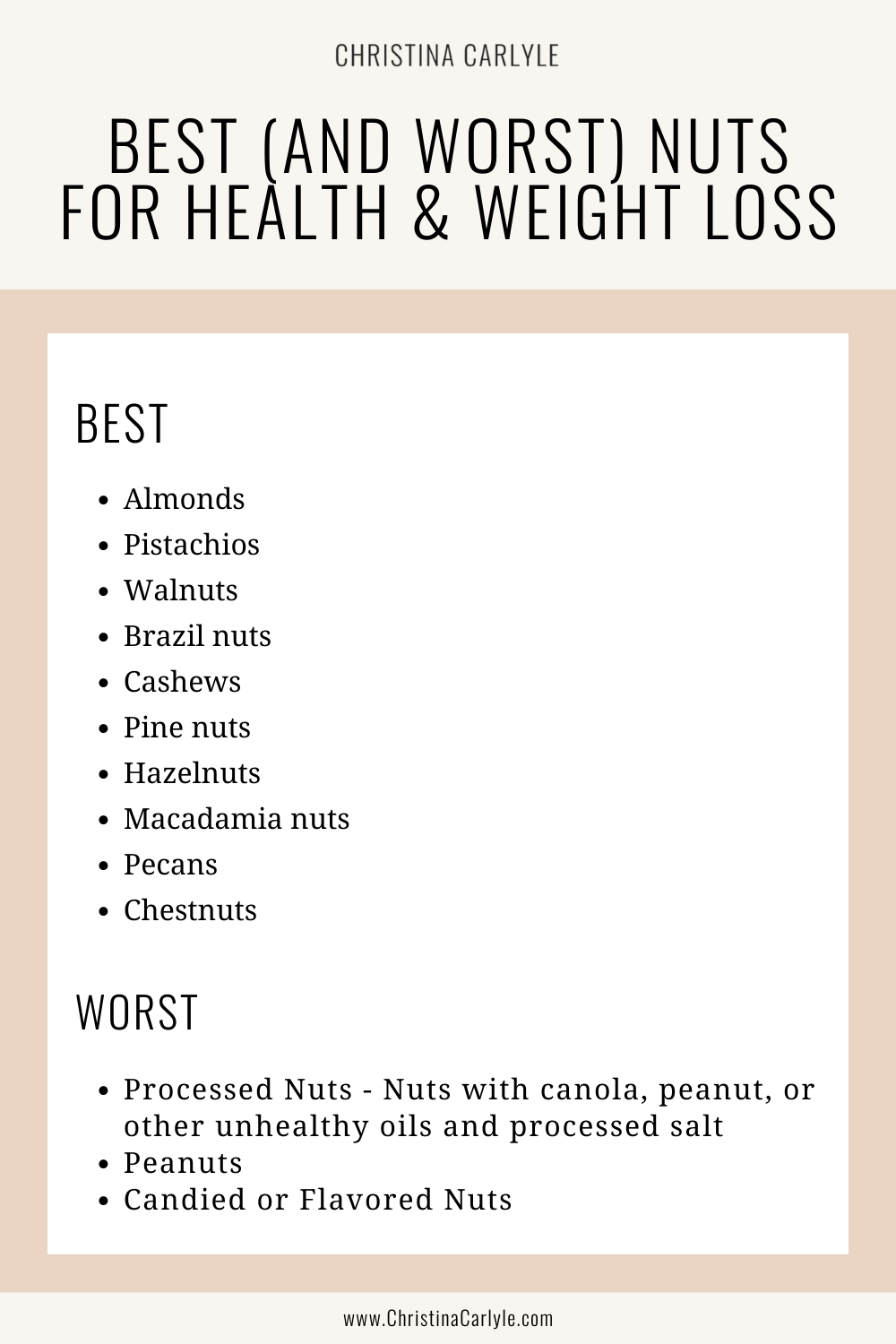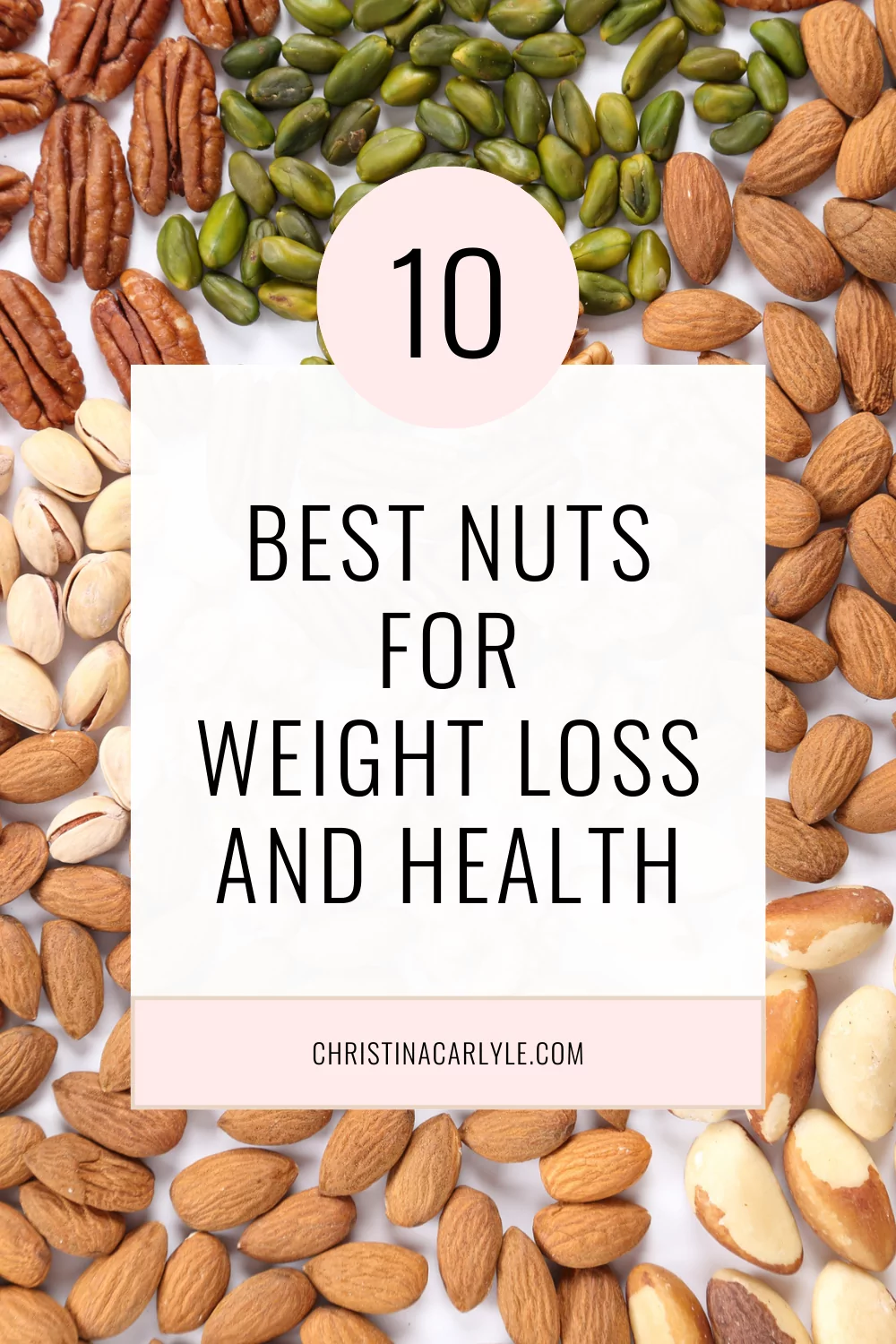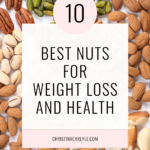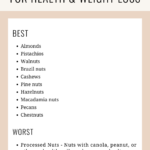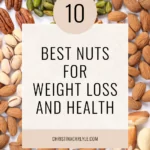Last Updated on August 14, 2023
This post is all about the best nuts for weight loss. If you love nuts and want to be fit and healthy this post is for you!
I constantly get asked, “What’s the best…(enter any food, drink, and supplement that you can think of) for weight loss?”. Enter my “best of” series, in which I’ll be sharing the best foods for weight loss. Like the best cooking oils and the best fruits for weight loss.
Here I’m discussing the best nuts for weight loss and wellness ranked from highest to lowest based on the metabolism and health benefits they have.
Misconceptions about nuts often center around the idea that they cause weight gain due to their high and fat content. But certain nuts have valuable health and metabolic benefits. If you’re wondering whether nuts are good for weight loss you need to get the right kinds, in the right amounts.
I’ll explain:
- How nuts are good for weight loss and wellness
- The Top 10 Best Nuts
- The serving size
- Tips to get the most benefits from nuts
How do nuts help Weight Loss & Health?
There are several misconceptions surrounding nuts and their impact on weight loss. Let’s explore some of these misconceptions and clarify the reality:
- High Calorie and Fat Content: One of the most common misconceptions is that nuts should be avoided during weight loss because they are high in calories and fats. While it’s true that nuts are calorie-dense, they are also nutrient-dense, providing essential vitamins, minerals, and healthy fats. Moderation is key when including nuts in a weight loss plan.
- Fear of Fats: Some people believe that consuming fats, even healthy fats found in nuts, will hinder their weight loss efforts. However, dietary fats are an important part of a balanced diet and can contribute to satiety, helping to control hunger and prevent overeating.
- Carbohydrate Concerns: Nuts do contain carbohydrates, but most of their carbohydrate content comes from fiber, which is beneficial for weight loss. Fiber aids in digestion, promotes a feeling of fullness, and helps regulate blood sugar levels.
- Snack Sabotage: Some individuals fear that snacking on nuts will sabotage their weight loss goals. While excessive snacking on any food can lead to weight gain, moderate portions of nuts can be a healthy and satisfying snack option.
- Nut Allergies: People with nut allergies might avoid nuts altogether, assuming they are universally bad for weight loss. While it’s true that those with allergies must avoid nuts, for others, they can be part of a balanced diet.
The Reality? Nuts can indeed be beneficial for weight loss when incorporated sensibly into a balanced diet. They offer numerous health benefits, including:
- Protein: Nuts are a good source of plant-based protein, which helps maintain and build lean muscle mass, supporting weight loss.
- Healthy Fats: Nuts are rich in monounsaturated and polyunsaturated fats, which are heart-healthy and can aid in reducing inflammation.
- Fiber: Nuts contain dietary fiber, which promotes satiety, aids in digestion, and helps regulate blood sugar levels.
- Nutrient Profile: Nuts provide essential vitamins (e.g., vitamin E), minerals (e.g., magnesium), and antioxidants that contribute to overall health. Some nut’s nutrient profiles are better than others.
This blend of fats, fibers, proteins, and phytochemicals makes nuts a healthy and complete snack that’ll help get you feeling full quickly without a lot of volume.
While it’s true that nuts are calorie-dense, it’s essential to recognize that they also come packed with vital nutrients. These nuts are primarily rich in unsaturated fats, which play a protective role against various diseases, promoting overall well-being.
Additionally, incorporating healthy nuts into your diet can promote satiety, helping you feel fuller for longer periods. As a result, this can create an opportunity to consume fewer calories during subsequent meals.
Nuts are literally a life-giving food because you can grow another plant from it. There are lots of life-giving benefits in nuts… and some nuts have more benefits than others.
The key is to consume nuts in moderate portions as part of a balanced diet that includes a variety of whole foods. It’s also wise to eat nuts with the most benefits *and least associated issues.
10 Best Nuts for Weight Loss and Wellness
Here is a list of the best nuts for weight loss ranked from highest (1) to lowest (10) based on how many nutrients, phytochemicals, proteins, fibers, and fats they contain. The more beneficial for the metabolism and immunity they are, the higher they’ll rank.
1. Almonds
Almonds are a powerhouse of nutrients, notably rich in vitamin E, an antioxidant that safeguards cells from oxidative damage and aids in immune function and cellular communication. Besides being a good source of healthy fats, protein, fiber, vitamins, and minerals, almonds have been linked to reduced heart disease risk factors, such as elevated LDL (bad) cholesterol and excess belly fat.
A 12-week study of 219 young adults showed that those consuming 2 ounces (56 grams) of almonds daily experienced significant reductions in LDL cholesterol, inflammatory markers, and hemoglobin A1c, a marker of blood sugar control (10Trusted Source). Moreover, almonds contribute to gut health by promoting the growth of beneficial gut bacteria, including Bifidobacteria and Lactobacillus species.
2. Pistachios
Pistachios offer a wealth of nutrients, including vitamin B6, crucial for nutrient metabolism and immune function (14Trusted Source). Moreover, these nuts are packed with beneficial plant compounds like lutein, zeaxanthin, anthocyanins, flavonoids, and proanthocyanidins, all boasting potent antioxidant and anti-inflammatory properties.
In a 4-month study with 100 overweight participants, one group consumed 1.5 ounces (42 grams) of pistachios daily alongside a group-based behavioral weight loss program, while the other group only followed the weight loss program. Although both groups lost similar amounts of weight, the pistachio group experienced significant reductions in blood pressure and notable increases in blood antioxidant levels. Additionally, they consumed more fiber and fewer sweets compared to the control group.
3. Walnuts
Walnuts are high in alpha-linolenic acid (ALA), an omega-3 fatty acid that benefits by reducing inflammation. They are also an excellent natural source of copper, a vital mineral essential for enzyme production, energy synthesis, and neurotransmitter function. Copper plays a key role in immune function, blood vessel development, and various other bodily processes.
Research indicates that walnuts offer significant benefits for heart health, potentially lowering risk factors associated with heart disease, including elevated blood pressure, LDL (bad) cholesterol, and triglyceride levels.
Moreover, both human and animal studies suggest that daily consumption of 1–2 ounces (28–57 grams) of walnuts may positively impact brain function and reduce risk factors for dementia, such as heart disease and type 2 diabetes.
4. Brazil nuts
Brazil nuts are an excellent source of selenium, a vital nutrient that supports thyroid function and metabolism. Additionally, these nuts contain various vitamins and minerals, including vitamin E and magnesium, crucial for blood sugar and blood pressure regulation, nerve function, and energy production.
Brazil nuts are one of the richest dietary sources of selenium, essential for critical functions like thyroid hormone production and DNA synthesis. However, it’s essential to consume them in moderation, limiting intake to a few nuts per day to avoid exceeding the upper limit of 400 mcg, which may lead to selenium poisoning. Nevertheless, such a condition is more likely to occur from excessive selenium intake through supplements rather than from food.
Brazil nuts’ selenium concentration can vary depending on various factors, and this mineral acts as a powerful antioxidant, potentially protecting against oxidative damage.
5. Cashews
Cashews contain healthy monounsaturated fats and a rich supply of nutrients crucial for bone health, such as protein, vitamin K, magnesium, and manganese.
Several studies have examined the potential benefits of a cashew-rich diet on metabolic syndrome, a condition characterized by elevated blood pressure, blood fat levels, blood sugar, and abdominal fat, which can increase the risk of heart disease and diabetes.
A comprehensive review of five studies showed that including cashews in the diet led to significant reductions in blood pressure and triglyceride levels.
6. Pine nuts
Pine nuts contain pinolenic acid, a fatty acid believed to aid in appetite suppression and promote a feeling of fullness. These nuts offer weight loss and wellness benefits due to the appetite-suppressing pinolenic acid and healthy monounsaturated and polyunsaturated fats they contain.
They are nutrient-dense, providing essential vitamins and minerals such as vitamin E, vitamin K, magnesium, and zinc. Incorporating pine nuts into a balanced diet can support overall health and help you feel satisfied after meals.
7. Hazelnuts
Abundant in dietary fiber, vitamin E, and beneficial fats, hazelnuts are a nutritious addition to your diet. Not only do they provide essential vitamins and minerals, but they are also rich in plant compounds such as gallic acid, epicatechin, caffeic acid, and quercetin, which boast antioxidant and anti-inflammatory properties.
By incorporating hazelnuts into your meals, you can enhance your diet’s quality and boost your intake of antioxidants. Furthermore, according to a review, regular consumption of hazelnuts may contribute to lowering heart disease risk factors like elevated LDL (bad) cholesterol and total cholesterol.
8. Macadamia nuts
High in monounsaturated fats and low in omega-6 fatty acids, macadamia nuts promote a healthy balance of fats in your diet.
These nuts are rich in healthy fats and contain fewer carbs compared to many other nuts, making them a preferred option for individuals following low-carb diets.
Incorporating macadamia nuts into your diet can have various health benefits. Studies indicate that consuming tree nuts, including macadamia nuts, may contribute to reducing LDL (bad) cholesterol, triglycerides, and blood sugar levels.
9. Pecans
Pecans offer a combination of antioxidants and fiber, supporting overall health and aiding digestion. These nuts, like others, provide a rich source of healthy fats, fiber, vitamins, and minerals.
Notably, pecans are a good natural source of zinc, a mineral crucial for immune function, wound healing, DNA synthesis, and growth and development.
Furthermore, research indicates the potential benefits of pecans for heart health. A small 8-week study involving 56 people at risk of heart disease revealed that those who consumed pecans daily experienced significant reductions in LDL (bad) cholesterol and triglyceride levels compared to a control group.
10. Chestnuts
Low in fat and calories compared to other nuts, and a good source of dietary fiber and vitamin C, Chestnuts can be beneficial for weight loss and overall health due to their unique nutritional composition. They are relatively low in calories compared to other nuts, making them a suitable snack option for those aiming to lose or maintain weight. Additionally, chestnuts are a good source of dietary fiber, which aids in digestion, promotes a feeling of fullness, and helps regulate blood sugar levels.
One of the advantages of chestnuts is their lower fat content, especially in comparison to other nuts. The fats found in chestnuts are primarily unsaturated, which is considered heart-healthy.
What is the serving size for Nuts?
Nuts should be consumed for their benefits but also limited because they contain antinutrients.
Try to have at least 1 ounce or handful of nuts a day. This is approximately 15-25 nuts depending on how big they are. I recommend eating 20 nuts as a serving.
TIPS TO GET THE MOST BENEFITS FROM NUTS
Nuts contain phytic acid, also known as phytate, which is a storage form of phosphorus in plants. Phytic acid is an antinutrient found in varying amounts in different types of nuts and seeds. While phytic acid has some health benefits, it can also interfere with the absorption of certain minerals, such as iron, zinc, calcium, and magnesium, in the human digestive system. This is because phytic acid can bind to these minerals, forming complexes that are not easily absorbed by the body.
To reduce the phytic acid content in nuts and seeds and improve mineral absorption, you can use a process called “nut soaking” or “nut sprouting.” Here’s how you can do it:
- Soaking: Place the nuts in a bowl and cover them with water. Add a pinch of salt to the water and let the nuts soak for a specific period. Different nuts have a different soak time:
- Almonds and hazelnuts: Soak for about 8-12 hours.
- Cashews: Soak for about 2-3 hours.
- Walnuts, pecans, and pine nuts: Soak for about 4 hours.
- Pistachios: Soak for about 8 hours.
- Rinse: After the soaking time is over, drain and rinse the nuts thoroughly to remove the phytic acid and enzyme inhibitors released during soaking. Spread the nuts on a lined baking sheet so they can dry.
- Dehydrate (optional): If you prefer crunchy nuts, you can dehydrate the soaked nuts in a food dehydrator or an oven at a low temperature until they are completely dry.
- Add oil/salt (optional): After your nuts are dry you can toss them in healthy cooking oils and add Celtic or Himalayan salt. Then dehydrate them in the over at a low temperate for a few hours until they’re dry and crunchy/cripsy.
Soaking and rinsing helps reduce the phytic acid content, making the nutrients in nuts more bioavailable. Additionally, it can also make nuts easier to digest by breaking down enzyme inhibitors that can cause digestive discomfort. So if you have any gut health issues I recommend always soaking your nuts.
When you’re in the grocery store it’s best to look for raw/plain nuts to soak. Then salt and oil you own. Most salted store-bought nuts use inflammatory oils and processed salts.
Keep in mind that while soaking can help reduce phytic acid, it may also slightly decrease some of the water-soluble vitamins in nuts. However, the trade-off is usually worth it, as you’ll still get the benefits of improved mineral absorption and easier digestion. By incorporating soaked nuts into your diet, you can enjoy the health benefits of nuts without the potential negative effects of phytic acid on mineral absorption.
Tips To Get More Nuts in your Diet
- Try replacing your unhealthy processed snacks with nuts instead.
- Use nuts on salads instead of croutons.
- Top nice cream with nuts
- Enjoy nuts blended into your smooth to add a fun crunch
- Put nuts on a charcuterie board
- Nuts also make an excellent snack to take on flights and while you travel.
- Avoid unhealthy nuts & antinutrients (keep reading)
Unhealthy Nuts to Avoid
- Processed Nuts – Nuts in packaging that has canola, peanut, or other unhealthy oils and processed salt.
- Peanuts – Peanuts are highly allergenic and one of the most common food allergens. Allergic reactions to peanuts can range from mild to severe, including anaphylaxis, a life-threatening allergic reaction.
- Candied or Flavored Nuts – While the nuts themselves might be healthy, candied or flavored nuts (e.g., honey-roasted, salted, or sugared nuts) often contain added sugars, salt, or unhealthy fats, which can undermine their health benefits. Consuming nuts in their natural state or lightly roasted without added unhealthy ingredients is a better option.
Avoid these kinds of nuts and stick to the ones on my list to get more healthy nuts into your diet.
I hope this post helped you.
What healthy nut is your favorite? For me, it’s 10000% almonds!
Sign up for your free kickstart workout plan below so you wont miss my next “Best” food feature.
Ciao for now.
Your Coach & Biggest Cheerleader,
![]()
If you liked this article you’ll love everything else in my Best Foods for Weight Loss Series
- Best Healthy Cooking Oils
- Best Protein Powders for Weight Loss
- Best Supplements for Weight Loss
- Best Fruits for Weight Loss
- Best Vegetables for Weight Loss
- Best Milk for Weight Loss
- Best Carbs for Weight Loss

